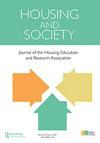Winning in a “lose-lose” environment of economic development: housing, community empowerment, and neighborhood redevelopment in the Columbia Heights neighborhood of Washington, DC
Q2 Social Sciences
引用次数: 2
Abstract
ABSTRACT Economic development is often billed as the basis and justification for neighborhood revitalization in low-income communities, bringing with it new jobs, amenities, and residents. Best practices in local housing policy suggest that inclusionary zoning can be a remedy to the increasing home prices and rents resulting from the changing demographics. However, inclusionary zoning remedies have been largely insufficient and remain part of a negotiated package of community benefits that do not reflect that collective agency of the existing community. This paper examines how tenant-centered affordable housing and community-based planning can provide a useful counter-narrative to the economic development and community benefits stories of the back-to-the city era urban redevelopment in Washington, DC. While DC has developed progressive laws and resources to enable low-income residents to remain in their communities, the fast-moving market has exposed conflicts between social and economic goals. Using the example of neighborhood revitalization efforts in Washington, DC, I examine the often-conflicting how economic development goals interact with community empowerment and the mechanisms to enable community control that change how residents experience revitalization.在经济发展的“双输”环境中获胜:华盛顿特区哥伦比亚高地社区的住房、社区赋权和社区重建
经济发展经常被宣传为低收入社区社区振兴的基础和理由,带来新的就业机会、便利设施和居民。当地住房政策的最佳实践表明,包容性分区可以补救因人口结构变化而导致的increasingÂ房价和租金。然而,包容性分区补救措施在很大程度上是不够的,并且仍然是协商的一揽子社区利益的一部分,没有反映现有社区的集体机构。本文探讨了以租户为中心的经济适用房和以社区为基础的规划如何为华盛顿特区回归城市时代的城市重建的经济发展和社区利益故事提供有用的反叙事。虽然特区制定了进步的法律和资源,使低收入居民能够留在社区,但快速发展的市场暴露了社会目标和经济目标之间的冲突。以华盛顿特区的社区振兴工作为例,我研究了经济发展目标如何与社区赋权相互作用,以及使社区控制改变居民体验振兴的机制,这些往往是相互冲突的。
本文章由计算机程序翻译,如有差异,请以英文原文为准。
求助全文
约1分钟内获得全文
求助全文
来源期刊

Housing and Society
Social Sciences-Urban Studies
CiteScore
2.30
自引率
0.00%
发文量
10
期刊介绍:
Housing and Society is the journal of the Housing Education and Research Association (HERA). The journal supports the mission of HERA by providing for the dissemination of research and other scholarly work. Submissions from a broad range of perspectives are encouraged. Topics in housing include: policy, design, social aspects, gerontology, behavioral aspects, energy/environment, equipment, interiors, economics, theory/model development, education, and program development or evaluation. The journal welcomes the submission of original research articles, notes and commentaries. Notes are shorter manuscripts presenting succinct information on housing related to one of the following categories: - Research: exploratory or not heavily theory-based or statistically analyzed - Academic: innovative teaching ideas - Program: development, implementation, and/or evaluation of Cooperative Extension or other housing programming efforts - Policy: examination of policy impact, comparative analysis, and/or need to achieve housing goals - Reviews: books, documentaries, etc.
 求助内容:
求助内容: 应助结果提醒方式:
应助结果提醒方式:


